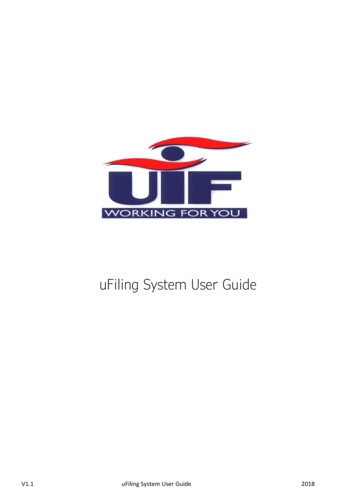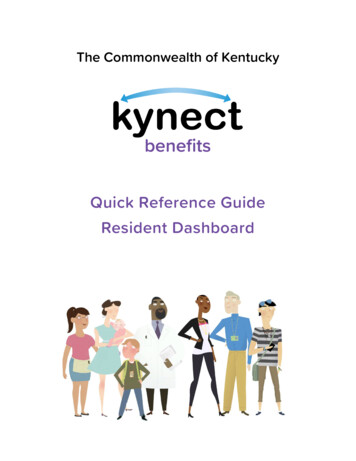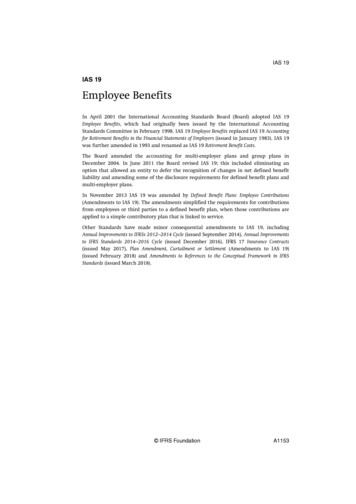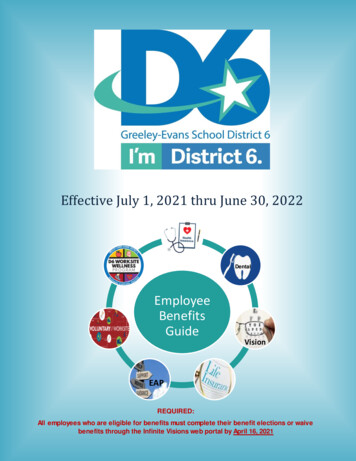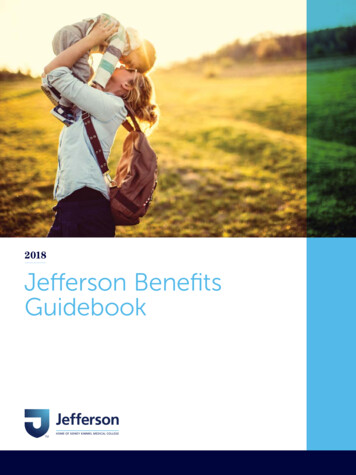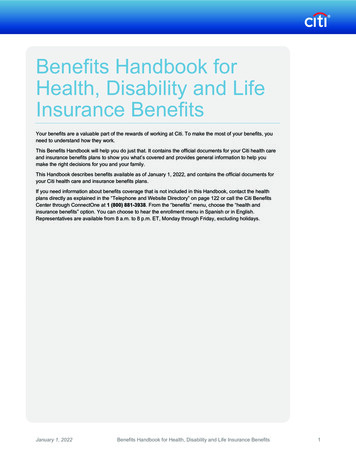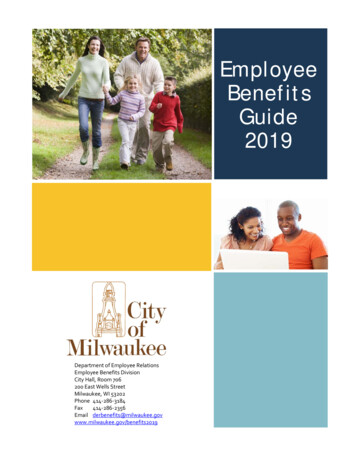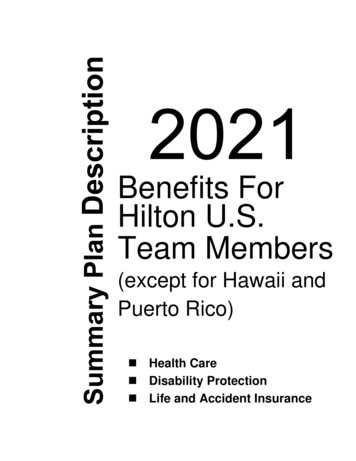
Transcription
PRISON LAW OFFICEGeneral Delivery, San Quentin CA. 94964Telephone (510) 280-2621 Fax (510) 280-2704www.prisonlaw.comDirector:Donald SpecterManaging Attorney:Sara NormanStaff Attorneys:Rana AnabtawiSusan ChristianRebekah EvensonSteven FamaPenny GodboldMegan HaglerAlison HardyCorene KendrickKelly KnappMillard MurphyLynn WuBenefits Available to Parolingand Discharging Inmates(Revised August 2011)YOUR RESPONSIBILITY WHEN USING THIS MANUALWhen we wrote this material we did our best to give you useful and accurate informationbecause we know that prisoners often have difficulty obtaining legal information and we cannotprovide specific advice to each prisoner who requests it. The laws change frequently and aresubject to different interpretations. We do not always have the resources to make changes to thismaterial every time the law changes. If you use this information, it is your responsibility tomake sure that the law has not changed and is applicable to your situation. If you need legalassistance, you should contact the State Bar of California Lawyer Referral Service Program at1-866-442-2529, the lawyer referral directory at www.lawhelpcalifornia.org, or any of theadvocacy agencies described in this material.Board of DirectorsPenelope Cooper, President Michele WalkinHawk, Vice President Marshall Krause, TreasurerHonorable John Burton Felecia Gaston Christiane Hipps Margaret JohnsCesar Lagleva Laura Magnani Michael Marcum Ruth Morgan Dennis Roberts
OVERVIEWOnce you are paroled or discharged, you may be eligible for a number of federal, state,and local assistance programs.1 However, you generally will not receive any special status forbenefits because of your recent release and will need to meet the same eligibility requirements asother people in order to get benefits. Before your release, if possible, you should investigate thevarious federal, state, and county programs to see if you are eligible for any of them and send aletter to the appropriate government office asking about the application process. Then, once youare released, you should seek advice from an advocate, such as a local legal servicesorganization (“legal aid”). In addition, your correctional counselors (before release) and paroleagents (after release) should be able to help you try to learn about benefits and sign up for them.The California Department of Corrections and Rehabilitation (CDCR) publishes a CommunityResource Directory listing organizations and agencies that can provide services and help toparolees at www.CDCR.ca.gov/Community Partnerships/Resource Directory.aspx. Anothersource of information, especially for people with disabilities, is Disability Rights California(formerly Protection and Advocacy), which has a website with information on various benefitsprograms at www.disabilityrightsca.org and can be reached toll-free at 1-800-776-5746 (TTY: 1800-719-5798).2This material provides an overview of the types of benefits and other funds that may beavailable, along with the general eligibility requirements and restrictions of each; it is not acompletely comprehensive guide. You should check with the government offices that run thebenefits programs to make sure you are aware of the application process and all restrictions,requirements, deadlines, and updates. Our office is unable to provide further specific assistanceon this issue, but the information provided here should serve as a starting point from which youcan begin your own research.Note that if you are already receiving benefits when you become incarcerated, you willnot be allowed to keep receiving most of them unless you are imprisoned for only a very shortperiod. Also, if you do not inform any current benefits providers that you are incarcerated andyou continue to draw benefits while in jail or prison, you may be required to pay the money backor even be subject to fraud investigations or criminal charges.1The CDCR can continue to collect money for any restitution you may still owe while you are on parole, plusa 10% administrative fee. Penal Code § 2085.5(d)-(f). The CDCR may be able to take the restitution money from someforms of public benefits, but it cannot take Social Security or Veterans Administration benefits because those benefitsare supposed to be available for current use by the recipient. Nelson v. Heiss (9th Cir. 2001) 271 F.3d 891, 895.2Application forms and information about various public benefits can be found on the websites of the agenciesthat administer the programs. There are also websites that provide self-help materials and contact information for legalaid providers, including the California Courts Self-Help Center (www.courtinfo.ca.gov/selfhelp andwww.courts.ca.gov/selfhelp.htm) and LawHelpCalifornia (www.lawhelpcalifornia.org). Parolees and former prisonerscan get free access to the Internet at public libraries.Prison Law Office Benefits Letter (8/2011) – 2
1.Funds Available Upon Releasea.Trust Fund AccountsWhen you are paroled or discharged from prison, the CDCR must return all of yourproperty, including any money in your trust account.3 This includes money you brought toprison, earned while in prison, or received while in prison (such as gifts or lawsuit settlements).Trust account funds are typically given in the form of a check.b.Gate MoneyWhen you are paroled or discharged from a CDCR institution, you are usually entitled toa small sum of money known as release funds or “gate money.”4 The amount is set by law andchanges from time to time. Your parole agent is responsible for giving you the money, so youmay not get it all at once.5 Some people do receive the entire amount upon release, but mostparoling or discharging prisoners receive about half immediately and the rest later. Your paroleagent must give you all of the money within 60 days. If you are released to the custody of theDepartment of Mental Health (DMH), you do not receive your gate money until you are releasedfrom DMH custody.6If you want to buy street clothes or a bus ticket for your release, you must pay for themout of your gate money.7 You are not given extra money to cover the cost of these items.If you are a parole violator who has served less than six consecutive months on arevocation term prior to release, you will not receive the full amount of gate money. Instead,you will receive a fraction of the total for every day you served in revocation, up to themaximum authorized.8If you are released to a re-entry facility, you are eligible for up to one-half of themaximum amount of gate money. If you are released to the custody of another state or thefederal government, including the U.S. Immigration and Customs Enforcement (ICE) if you area non-citizen, you are not entitled to any release funds at all.3Penal Code § 2085.4Penal Code § 2713.1; DOM § 81010.6.515 CCR § 3075.2(d); DOM § 81010.6.1; see Penal Code § 2713.1.615 CCR § 3075.2(d)(7); see DOM § 81010.6.1.715 CCR § 3075.2(d).8DOM § 81010.6.Prison Law Office Benefits Letter (8/2011) – 3
c.Cash Assistance and Bank DraftsIf you need additional money, you can ask your parole agent for a loan.9 Your paroleagent will lend you a small amount of cash if the funds are available and he or she determinesthat you truly need the money and cannot get it anywhere else. Your parole agent’s supervisormust approve loans that, alone or in combination, exceed a certain amount. You are expected topay such cash assistance loans back as soon as your employment and personal circumstancespermit.Another type of loan your parole agent can give you is a bank draft.10 This is a checkused for casework services, such as housing, food, or clothing. The check may be made out toyou or to the company you are buying the services from. Loans for such “over-the-counterpurchases,” which are typically larger than cash assistance loans, also must be repaid when yourcircumstances allow you to.Keep in mind that your parole agent and his or her supervisor are the ones who decidewhether you should get a loan and for how much; you are not automatically entitled to one.Also, if you return to prison on a parole violation before you have repaid the loan, you will haveto repay it when you are released again.2.Workers’ Compensation BenefitsIf you are hurt on the job or get a disease caused by your job, you may be eligible forworkers’ compensation benefits. Workers’ compensation is a special program that coversmedical care costs for injured employees and compensates them for wages lost due to temporaryor permanent disability. In 1976, the California state legislature made CDCR prisoners eligiblefor workers’ compensation benefits under certain circumstances.11 In addition, a prisonersometimes might be able to bring a federal civil rights suit for money damages arguing that theprison job conditions constituted cruel and unusual punishment.12CDCR prisoners are eligible for workers’ compensation benefits when (1) they areengaged in assigned work and (2) the injury arises out of and in the course of the assignedwork.13 However, even if you qualify for workers’ compensation due to an in-prison job-related9DOM § 81070.1.10DOM § 81070.2. Cash assistance funds and bank drafts were originally designed and operated as twoseparate programs. DOM § 81070.1 (“Cash assistance loans are not part of the bank draft system.”). Now, however,the funding sources have merged into one program and most loans are given as bank drafts rather than in cash.11Labor Code § 3370.12See W allis v. Baldwin (9th Cir. 1995) 70 F.3d 1074 (requiring prisoner to clean attic when jailers knew orsuspected presence of asbestos could violate Eighth Amendment).13Labor Code § 3370.Prison Law Office Benefits Letter (8/2011) – 4
injury, you are prohibited from actually receiving any wage compensation during the time youare incarcerated. Instead, such benefits will begin once you are released.14There are important differences between temporary and permanent disability payments.Temporary disability benefits compensate you for wages lost due to a short-term disability. Youcannot receive temporary disability payments during your incarceration, and upon release youare not entitled to temporary disability benefits for wages lost while you were incarcerated.15Thus, the only temporary disability benefits available would be for lost wages you suffer afteryour release. Such benefits, which are set by law and change from time to time, could last for aslong as 240 weeks, provided your continuing disability is verified by a doctor.16Permanent disability benefits are awarded when an on-the-job injury or illness has longlasting effects. Again, you cannot receive permanent disability payments while incarcerated.The amount of any permanent disability payments you receive upon release will depend on yourage, the degree of disability suffered, and the job you were doing when the injury or illnessoccurred. For purposes of computing permanent disability benefits, prisoners are considered“common laborers” regardless of the specific work they did in prison.17If you are released and begin to receive benefits, and then you are re-incarcerated in jailor prison, your benefit payments will be suspended.18 On the other hand, if you had beenreceiving benefits due to an injury that happened before you were incarcerated, the benefits willcontinue, but will be paid to your dependents until you are released.19When you suffer an on-the-job injury or illness while incarcerated, both you and your jobsupervisor must fill out paperwork for the State Compensation Insurance Fund (SCIF), theagency responsible for determining workers’ compensation benefits, to start the claim process.20You should fill out the “employee” portion of the SCIF Form 3301 Worker’s CompensationClaim and submit it to the job supervisor. You should do this immediately, or in any case nolater than 30 days after the injury occurs or the illness starts. The job supervisor shouldcomplete the “employer” section of the form and forward it to the claims administrator.14Although workers’ compensation also covers the cost of medical care or treatment for an on-the-job injury,prisoners usually are not entitled to medical cost benefits since the CDCR pays for their treatment while incarcerated.15Labor Code § 3370(a)(3)-(4).16Labor Code §§ 4453 and 4656.17Labor Code § 3370(a)(8).18Labor Code § 3370(a)(3).19Labor Code § 3370(d). If you have no dependents the money will be paid into a trust fund available uponyour release.20The SCIF provides useful information and claims forms on its website at www.scif.com. The Departmentof Industrial Relations (www.dir.ca.gov) also provides information on this topic.Prison Law Office Benefits Letter (8/2011) – 5
If there is a dispute regarding your eligibility for benefits, you may file an applicationwith the Workers’ Compensation Appeals Board (WCAB) at any time while you areincarcerated, or up to one year after you are released or discharged.21 (A claim may be acceptedlater if the injury or illness was not discoverable before that time.) You file a WCAB applicationon a Division of Workers’ Compensation (DWC)/WCAB Form 1A Application for Adjudicationof Claim. A judge is then assigned to the case, and he or she may refer you to a list of workers’compensation lawyers if you request representation or if the issues are complex.22 You cancontact the lawyers and try to convince them to represent you at your hearing before the WCAB,but they do not have to take the case.The Penal Code provides that vocational rehabilitation services can be provided toinjured prisoners to help them engage in suitable employment upon release.23 If you suffer awork-related disability that continues for at least 28 days and there is a reasonable expectationthat you would benefit from a rehabilitation program, you are to be notified of the availability ofrehabilitation services.24 Any rehabilitation program will be instituted by the workers’compensation coordinator at the prison. When you are released, the coordinator must notify theSCIF so that the SCIF can initiate a rehabilitation program. Rehabilitation services are anadditional benefit; they are not intended to replace monetary workers’ compensation benefits.3.Department of Veterans Affairs BenefitsThe federal Department of Veterans Affairs (VA) provides various benefits (including apension, education and healthcare benefits, and rehabilitation services) to disabled veterans ofthe U.S. military. Unlike many other benefits, some VA payments are available to you whileyou are still in prison if you otherwise qualify. However, the benefits have been cut significantlyfor veterans who are still incarcerated, and your dependents, if any, may be entitled to theamounts not paid to you.25 No VA benefits will be provided to a veteran or dependent wantedfor an outstanding felony warrant.The VA’s Healthcare for Reentry Veterans Program (HCRV) offers outreach to veteransincarcerated in state and federal prisons, and referrals and short-term case managementassistance upon release from prison. In addition, the Veterans Justice Outreach Program (VJO)offers outreach and case management to veterans who are involved in law enforcementencounters, overseen by treatment courts, and incarcerated in local jails.2621Labor Code § 3370(a)(6).22Labor Code § 3371.23Penal Code § 5069.24Ibid.; see also DOM § 31020.7.5.2.2.10.2538 C.F.R. § 3.665; 38 U.S.C. § 1114.26You can locate an outreach worker by visiting www.va.gov/HOMELESS/VJO.asp.Prison Law Office Benefits Letter (8/2011) – 6
The VA publishes a detailed handbook on benefits, in both English and Spanish, that isavailable for free at www.va.gov/opa/publications/benefits book.asp. You can also call 1-800827-1000 (TDD: 1-800-829-4833) and speak with a VA Regional Office representative. If yourquestion is about education benefits, call 1-888-GI-BILL-1 (1-888-442-4551).If you have questions about your military records, or want a copy of your records, visitthe National Archives and Records Administration’s (NARA) website at www.archives.gov/veterans/military-service-records or call 1-866-272-6272 (TDD: 301-837-0482). You may alsosend a letter requesting your records to:National Archives Personnel Records Center1 Archives DriveSt. Louis, MO 631384.Social Security Benefits (Title II)There are four ways to qualify for federal Social Security benefits: (1) as a retiree, (2) asa disabled individual, (3) as a spouse or dependent of an eligible individual, or (4) as a survivorof an eligible individual.27 Each of these is discussed in more detail below. You cannot get anySocial Security benefits while you are in prison or jail, or sent to another public institutionbecause of a conviction, if you are in custody for more than thirty days.28 This includes being inAtascadero State Hospital, Patton State Hospital, or any other clinical institution as a result ofbeing classified as a Sexually Violent Predator (SVP) or a Mentally Disordered Offender(MDO). Nor are you allowed to receive back payments for time spent in prison or jail. And,under the Social Security Administration’s “fleeing felon” regulations, you cannot collect anySocial Security benefits if you are considered to be fleeing to avoid prosecution or custody ofany court because of a felony conviction or warrant, or a condition of probation or parole.29Once you are paroled or discharged from prison you can apply for Social Securitybenefits. If possible, try to determine before you are released whether you may qualify for anyform of benefits, as the benefits may help you obtain necessities upon release. To apply forbenefits, you can obtain and complete some or all of the application forms online at the SocialSecurity Administration (SSA) website at www.ssa.gov, or call the SSA toll-free at1-800-772-1213 (TTY: 1-800-325-0778) to schedule an appointment with your local DistrictOffice or to have the forms sent to you. Make sure you write down the name of the person youtalk with and the date. If you apply within 60 days of the date of your first phone call to request2742 U.S.C. §§ 401-403. Detailed information, application forms, contact information for local offices, andanswers to frequently asked questions are available on the Social Security Administration website at www.ssa.gov.Legal Services for Prisoners with Children also publishes a “Manual on SSI/SSDI for Prisoners and Their Advocates,”available for free at www.prisonerswithchildren.org/pubs/ssi.pdf.2842 U.S.C. § 402(x)(1)(A)(i).2942 U.S.C. § 1382. In addition, a disability incurred in connection with the commission of a felony cannotform the basis of any Social Security benefit payment. 42 U.S.C. § 423(d)(6)(A). If you have been denied benefits orassessed an overpayment because of the “fleeing felon” regulations, you should seek legal assistance from a legal aidorganization as soon as possible to see whether you have grounds to appeal under these often complex rules.Prison Law Office Benefits Letter (8/2011) – 7
the application materials, the SSA will treat the first phone call as the date of your application.You can also get information and forms from your local Social Security office. If you are inimmediate need you should ask for the expedited application process.If you need help understanding or filling out the forms and cannot find someone to helpyou, ask for help from the SSA itself. Under Section 504 of the Rehabilitation Act, the SSA isrequired to help when you need help because of a disability. If you have been discriminatedagainst by the SSA for some unfair reason, such as a disability, you can file a discriminationcomplaint against the agency (see below).In general, the amount of assistance you receive is determined by the amount of moneyyou earn, including money you are getting from other sources. If you are denied benefits, it isimportant to file an appeal as soon as possible. To find a local attorney who will help, contactyour local legal aid office, call the State Bar of California Lawyer Referral Services Program at1-866-442-2529, or visit www.lawhelpcalifornia.org.a.Retirement BenefitsRetirement benefits are available to people 62 years or older. You should contact theSocial Security Administration to determine what your full retirement age is, because it dependson the year you were born. For example, if you were born in 1939, your full retirement age is 65years 4 months; if you were born between 1943 and 1954, it is 66 years; and if you were born in1960 or later, your full retirement age is 67 years. This is an important number to know becausealthough you can begin receiving benefits as early as 62, you will not receive your full monthlyallowance until you reach your full retirement age. If benefits begin before age 65, they will bereduced to account for the longer period over which they will be paid. If you delay retirementuntil you are 70 or older, you get a special credit for each month that you do not receive benefitsafter you reach age 70.Social Security benefits are paid out of money collected from Social Security taxes(FICA). For each year you work and pay FICA, you earn “credits,” up to 4 per year. Mostpeople need 40 credits to qualify for retirement benefits, so that is about 10 full years of workingand paying FICA. Your Social Security benefits are a portion of the amount of money youearned on average over your working lifetime. If you are not sure how many credits you haveearned through paying FICA or how much money you have made from working, there is an“Online Retirement Estimator” on the SSA website (www.ssa.gov) that you can use. You canalso call the SSA toll-free at 1-800-772-1213 and ask for Form SSA-7004 Request for SocialSecurity Statement. In addition, the SSA has a number of free publications, such as “How YouEarn Credits,” which you can request online or by calling the SSA.b.Social Security Disability Insurance BenefitsSocial Security Disability Insurance Benefits (DIB or SSDI) are available no matter whatyour age if you have enough work credits and have a severe physical or mental disability. Thelaw defines disability as the inability to do any “substantial gainful activity” (SGA) due to amedically determinable physical or mental impairment that can be expected to result in death orPrison Law Office Benefits Letter (8/2011) – 8
that has lasted (or can be expected to last) for at least 12 consecutive months.30 Beingunemployed or incarcerated are not considered disabilities, nor is drug or alcohol addiction.31There are somewhat different rules for determining disability for individuals who are legallyblind.32 SSDI is different than Supplemental Security Income (SSI; see below) and allows you tokeep some of your benefits for at least a little while when you go back to work.Many people who apply for SSDI are denied at first but get benefits once they appeal. Ifyou are denied, be sure to start the appeal process by filing a Request for Reconsideration within60 days after the date you receive notice of the initial determination.33 You can send your appealby mail, but it is best to submit it in person at the local Social Security office and get a time- anddate-stamped copy so that you can prove you submitted your appeal on time. If you miss the 60day appeal deadline due to circumstances beyond your control, such as hospitalization or illness,you should submit a written request for a “good cause exception” to the deadline along with yourRequest for Reconsideration.34 If your Request for Reconsideration is denied, you have the rightto file a Request for an Administrative Law Judge (ALJ) Hearing within 60 days after youreceive the denial notice.35 Although the SSA is in the process of revising the appeal processbeyond the ALJ stage, you ultimately have the right to proceed to federal court on your appeal.You should contact a legal aid organization or the local bar association lawyer referral servicefor assistance with your appeal.c.Family BenefitsIf you are eligible for retirement or disability benefits, family benefits might be availablefor your dependents. Family members who might be eligible are: (1) your spouse if he or she isat least 62 years old, or under 62 but still caring for a child under age 16; and (2) your children ifthey are unmarried and under the age of 18, under 19 but still in school, or 18 or older butdisabled. If you are divorced, your ex-spouse might be eligible for benefits on your record.36 Insome circumstances, your grandchildren might be eligible to receive dependent benefits.3020 C.F.R. § 416.905(a). The income threshold is readjusted from time to time; the SSA provides currentinformation at www.ssa.gov/OACT/COLA/sga.html.3142 U.S.C. § 423(d)(2).3220 C.F.R. § 416.905(b); see 20 C.F.R. §§ 416.981-416.985.3320 C.F.R. § 416.1409.3420 C.F.R. §§ 404.911(a) and 416.1411(a); see Social Security Ruling 91-5p for a discussion of mentalincapacity as the basis for a finding of good cause.3520 C.F.R. § 416.1433.3642 U.S.C. § 402.Prison Law Office Benefits Letter (8/2011) – 9
d.Survivor BenefitsSurvivor benefits are available to some of your family members when you die, if youearned enough Social Security credits while you were working.37 (Likewise, if the main wageearner in your family dies, you may be eligible for survivor benefits.) Family members whomay be eligible are: (1) your spouse if he or she is age 60 or older, age 50 or older and disabled,or of any age if caring for a child under age 16; (2) your children if they are unmarried and underthe age of 18, under 19 but still in school, or 18 or older but disabled; and (3) your parents, age62 or older, if you provided at least half of their support. A special one-time funeral benefitpayment may be made to your spouse or minor children when you die.If you are divorced and your spouse dies, you might be eligible to receive benefits as awidow(er) if the marriage lasted 10 years or more.38 Benefits paid to a surviving divorcedspouse who is 60 or older will not affect the benefit rates for other survivors who are receivingbenefits. In general, you cannot receive survivor benefits if you remarry before the age of 60unless the remarriage ends, whether by death, divorce, or annulment. If you remarry after age 60(50 if disabled), you can still collect benefits on your former spouse’s record. When you reachage 62 or older, you may get retirement benefits on your new spouse’s record if his or herbenefits are higher. Your remarriage would have no effect on any benefits being paid to yourchildren.5.Supplemental Security Income (Title XVI)Supplemental Security Income (“SSI”) is a joint program between the federal and stategovernments to pay for basic necessities, such as food, clothing, and shelter, for people who areelderly or disabled. The application, administrative, and appeal process for the SSDI and SSIprograms are identical.39 You should check with the Social Security Administration (SSA) tomake sure that you have applied for both disability programs simultaneously. In California, theSSI payment from both the federal and state governments is put into one federal check given outonce a month. Although given out by the SSA, SSI does not have the same work-creditrequirements as Social Security benefits, because SSI is not paid out of Social Security fundsand is based on financial need, not past earnings. This means that if you meet the SSIrequirements, you do not have to have worked a certain number of years to get the benefits. Thisis the main difference between SSI and SSDI.If you are initially denied benefits, be sure to appeal the decision (see above) and contacta local legal aid organization for assistance. As with SSDI, many people are denied SSI on thefirst request but get the benefits after they appeal.3742 U.S.C. § 402.3842 U.S.C. § 402.3942 U.S.C. §§ 1381-1383d. Detailed information and application forms for SSI benefits are available at theSocial Security Administration website at www.ssa.gov.Prison Law Office Benefits Letter (8/2011) – 10
To get SSI, you must be 65 or older, blind, or disabled.40 If you are disabled, thedisability must be expected to last for at least one year or end in death and must keep you fromdoing any “substantial gainful activity” (SGA). This is the same measurement used for SSDIbenefits (see above) and means that if you earn more than a certain amount per month, youprobably will not be considered disabled.41 Some of the other factors the SSA will look at inevaluating your claim for benefits are whether your disability interferes with basic work-relatedactivities, whether your condition is found on the SSA’s list of disabling impairments, whetheryou can do the work you have done at any point over the past 15 years, and whether you can doany other types of work. In looking at whether you can do other kinds of work, the SSA willlook at your age, education, past experience, transferable skills, and the demands of other typesof jobs as defined by the Department of Labor.To get SSI, you must also have little or no income and be of limited resources. Thismeans that the value of the things you own (besides your home and your car) must be less than acertain amount, which is set by law and differs for single and married people.42 If you qualifyfor SSI, you will also qualify for Medi-Cal (see below) and other assistance with medical care.In fact, if you receive SSI, you do not have to apply for Medi-Cal separately; you will receive itautomatically. (You must apply separately for any other benefits you may be eligible for.)However, if you get SSI in California you cannot get food stamps because SSI is supposed tocover food expenses.43 Also, as a condition of SSI eligibility, you must have applied for anyother cash benefits for which you may be eligible.The application process for SSI is long and can take between 12 and 18 months.44 It isbest to apply as soon as possible, even if you are still in prison. You can begin applying 90 daysbefore your release date.45 Although
1 The CDCR can co ntinue t o collect money for any restitution you may still owe whi le you are on p arole, plus a 10 % adm inistrative fee. Pe nal Cod e § 20 85 .5( d) -(f). The CDCR ma y be ab le to t ake the restitution mo ney from som e forms of public benefits, but it cannot take Social Security or Veterans Administration benefits because those benefits

